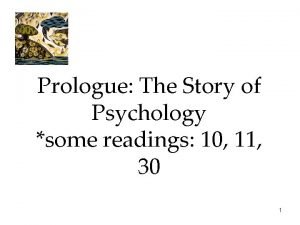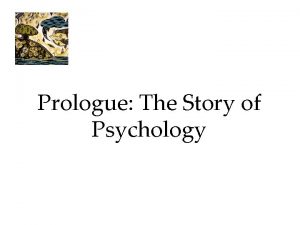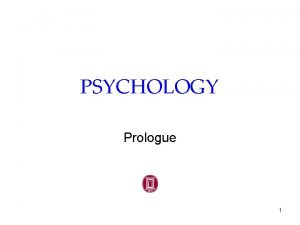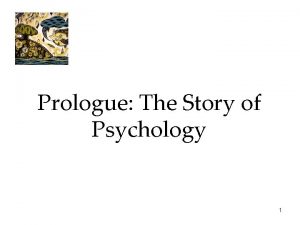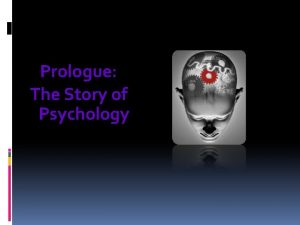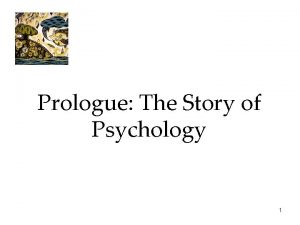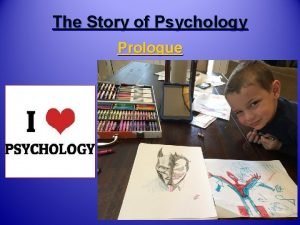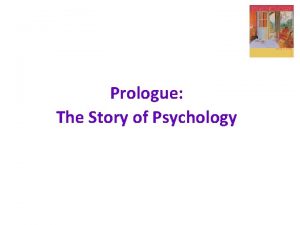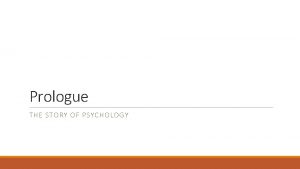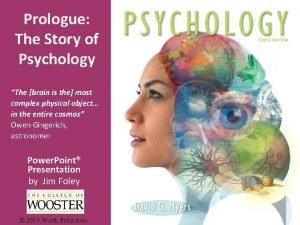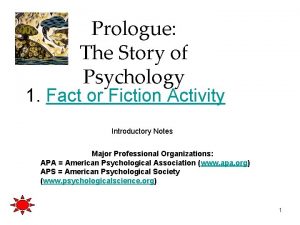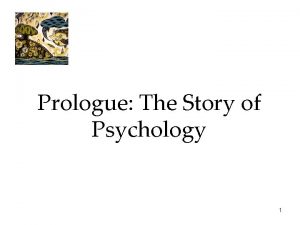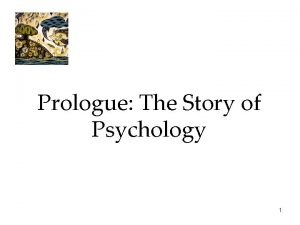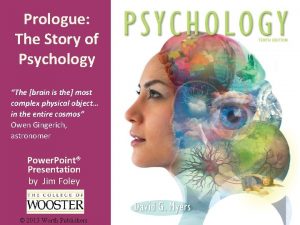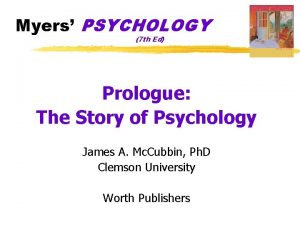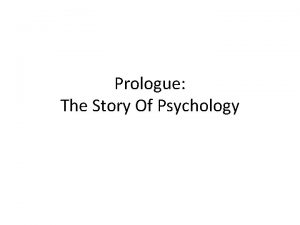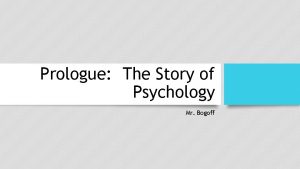Prologue The Story of Psychology I have made




































- Slides: 36

Prologue: The Story of Psychology “I have made a ceaseless effort not to ridicule, not to bewail, not to scorn human actions, but to understand them. ” Benedict Spinoza, A Political Treatise, 1677. 1

Psychology’s Roots Prescientific Psychology 2

Prescientific Psychology Confucius (551 -479 B. C. ) 3

Prescientific Psychology Hebrew Scriptures 4

Prescientific Psychology Plato Socrates (469 -399 B. C. ) and Plato (428 -348 B. C. ) Socrates and his student Plato believed the mind was separate from the body, the mind continued to exist after death, and ideas were innate. 5

Prescientific Psychology Aristotle (384 -322 B. C. ) 6

Prescientific Psychology Francis Bacon (1561 -1626) 7

Prescientific Psychology Rene Descartes (1596 -1650) & Dualism 8

Prescientific Psychology Thomas Hobbes (1588 -1679) & Materialism 9

Prescientific Psychology John Locke (1632 -1704) & Empiricism 10

Prescientific Psychology Darwin (1809 -1882) & Evolution * 1859 – publishes The Origin of Species * living things have arrived at their present shape through a long evolutionary process involving natural selection * organisms whose inherited characteristics were best adapted to their environment survived and reproduced while others died * later argued that the basic forms of human emotional expressions (such as laughing and crying) are inherited and may have evolved because of survival advantages associated with the ability to communicate one’s emotions/intentions to others of one’s kind * helped convince the intellectual world that human beings, despite their pretensions, can be understood through the methods of science 11

From speculation to science: The Birth of Modern Psychology Aristotle (4 th century BCE) asked questions to understand the relationship between body and psyche. His way of answering those questions was to observe… and make guesses. Wilhelm Wundt (1832 -1920) added two key elements to help make psychology a science: 1. carefully measured observations 2. experiments

Psychological Science is Born Structuralism Titchner (1867 -1927) Wundt (1832 -1920) Wundt and Titchener studied the elements (atoms) of the mind by conducting experiments at the University of Leipzig, Germany, in 1879. 13

Edward Titchener’s Structuralism

Psychological Science is Born Functionalism Margaret Floy Washburn James (1842 -1910) Influenced by Darwin, William James established the school of functionalism, which opposed structuralism. 15

Psychology Pioneers § Functionalism § Principles of Psychology. William James

Psychology Pioneers § First female president of the APA § Researcher on memory Mary Whiton Calkins

Psychology Pioneers § Second female APA president § Wrote The Animal Mind. § Studied with Edward Titchener, but was barred from his experimental psychology organization. Guess why. Margaret Floy Washburn, Ph. D

Trends in Psychological Science: Behaviorism By pairing a rat with a loud noise, Watson taught a baby (“Little Albert”) to fear furry things. This is called classical conditioning. John B. Watson Skinner used operant conditioning to teach pigeons to do amazing things to get rewards. He later wrote about how human communities could be shaped by this method. B. F. Skinner

Trends in Psychology: Freudian/Psychoanalytic Psychology Sigmund Freud § Sigmund Freud, founder of psychoanalysis, (late 1800’s): § He studied and helped people with a variety of mental disorders. § His school of study and treatment focused on the role of unconscious drives, wishes, and needs, and emphasized the importance of childhood experiences.

Trends in Psychology: Humanism Abraham Maslow Carl Rogers § Humanists: Abraham Maslow and Carl Rogers (1960 s): § studied people who were thriving rather than those who had psychological problems. § developed theories and treatments to help people to feel accepted and to reach their full potential. § “warm & fuzzy”

Shifting definitions of “psychology” Wilhelm Wundt and Edward Titchener, around 1900: “The science of mental life. ” Now we Johncombine B. Watson and these definitions: B. F. Skinner, “The science of behaviorists, 1920’s: “The behavior and scientific study ofmental observable behavior. ” processes. ” Cognitive psychologists, 1960’s, studied internal mental processes, helped by neuroscience.

Psychology Today We define psychology today as the scientific study of behavior and mental processes. Science – psychology endeavors to answer questions through the systematic collection and logical analysis of objectively observable data Behavior – observable actions of an individual person or animal Mind – an individual’s sensations, perceptions, memories, thoughts, dreams, motives, emotional feelings, and other subjective experiences 23

The Big Debate Nature versus Nurture Darwin (1809 -1882) Darwin stated that nature selects those that best enable the organism to survive and reproduce in a particular environment. 24

The Big Issue in Psychology: N-N The Nature. Nurture Question: To what extent are our traits already set in place at birth (our “Nature”)? And to what extent do our traits develop in response to our environment/ experience (our “Nurture”)?

Descartes: Some ideas are innate. Plato: Ideas such as “the good” and “beauty” are inborn. Aristotle: All knowledge comes through the senses. Nature vs. Nurture Charles Darwin: Some traits, behaviors, and instincts are part of the nature of the species. John Locke: The mind is a blank slate (blank chalkboard or screen) “written on” by experience.

We share a common origin that Nature gives us an inborn human nature in common. + We have differences Nurture that are shaped by our environment

“Nurture works on what Nature endows. ”

Biology Plus Environment. . are part of psychology’s three “biopsychosocial” levels of analysis. The deep level, Biology: genes, brain, neurotransmitters, survival, reflexes, sensation In the middle, Psychology: thoughts, emotions, moods, choices, behaviors, traits, motivations, knowledge, perceptions The outer level, Environment: social Influences, culture, education, relationships

The three levels as influences on some psychological phenomenon Example: Enjoying Depression Intelligence Soccer Example: Shyness

There are many perspectives for describing psychological phenomena: Cognitive perspective Social-cultural Behavioral genetics Neuroscience Psychodynamic Behaviorist Evolutionary From different angles, you ask different questions: How reliable is memory? How can we improve our thinking? Could our behavior, skills, and attitudes be “downloads” from our culture? Could our behavior, skills, and attitudes be genetically programmed instincts? What role do our bodies and brains play in emotions? How is pain inhibited? Can we trust our senses? Do inner childhood conflicts still plague me and affect my behavior? How are our problematic behaviors reinforced? How do our fears become conditioned? What can we do to change these fears and behaviors? Why are humans prone to panic, anger, and making irrational judgments?

Let’s play: “What’s my perspective? ” “Obsessivecompulsive disorder is a problem in the orbital cortex. ” “No, OCD is an inherited condition. ” “Compulsions start as habits and are rewarded by the anxiety relief they bring. ” “OCD comes from our natural instinct to control our environment. ” “No, OCD is a matter of mental habits and errors that can be corrected. ” “No, it’s a sign of unresolved childhood issues. ” “OCD thinking and behavior is a reaction to our fast-paced, outof-control lifestyles. ”

Psychology’s Subfields Type of research Applied Biological Clinical Psychology Developmental Counseling Psychology Cognitive Educational Psychology Personality Industrial-Organizational Social Community Psychology Positive Psychology Clinical Psychology

Psychology’s Subfields Research Examples Type of research Biological Developmental Cognitive Personality Social Positive Psychology Explore the structural problems in the brain that may be part of autism Study how the stages of cognitive and emotional development vary in autism Clarify the difficulties autistic children have with understanding sarcasm Decide whether traits like neuroticism need to be measured differently in autism Find how autistic children can learn social skills as procedures if not by intuition Explore what motivates people and contributes to life satisfaction

Psychology’s Subfields Applied Clinical Psychology Counseling Psychology Educational Psychology Industrial-Organizational Community Psychology Clinical Psychology Applied Use exposure therapy to decrease phobic reactions in a traumatized client Help someone achieve career goals despite family conflict and self-doubt Evaluate aptitudes and achievement to plan for a student with learning problems Figure out how a factory can improve coordination of tasks, roles, and personalities Help coordinate a city’s efforts to understand prevent elder abuse Use exposure therapy to decrease phobic reactions in a traumatized client

Psychology in context with other professions Psychiatrists are physicians, M. D. s or D. O. s. They can prescribe medication. In addition to clinical psychologists, professionals in social work, counseling, and marriage and family therapy may be trained to do psychotherapy.
 Prologue the story of psychology
Prologue the story of psychology Chrissie the story of tom brennan
Chrissie the story of tom brennan 8 faces 12 vertices 6 edges
8 faces 12 vertices 6 edges Hình ảnh bộ gõ cơ thể búng tay
Hình ảnh bộ gõ cơ thể búng tay Slidetodoc
Slidetodoc Bổ thể
Bổ thể Tỉ lệ cơ thể trẻ em
Tỉ lệ cơ thể trẻ em Chó sói
Chó sói Chụp tư thế worms-breton
Chụp tư thế worms-breton Hát lên người ơi
Hát lên người ơi Kể tên các môn thể thao
Kể tên các môn thể thao Thế nào là hệ số cao nhất
Thế nào là hệ số cao nhất Các châu lục và đại dương trên thế giới
Các châu lục và đại dương trên thế giới Cong thức tính động năng
Cong thức tính động năng Trời xanh đây là của chúng ta thể thơ
Trời xanh đây là của chúng ta thể thơ Mật thư anh em như thể tay chân
Mật thư anh em như thể tay chân Làm thế nào để 102-1=99
Làm thế nào để 102-1=99 Phản ứng thế ankan
Phản ứng thế ankan Các châu lục và đại dương trên thế giới
Các châu lục và đại dương trên thế giới Thể thơ truyền thống
Thể thơ truyền thống Quá trình desamine hóa có thể tạo ra
Quá trình desamine hóa có thể tạo ra Một số thể thơ truyền thống
Một số thể thơ truyền thống Bàn tay mà dây bẩn
Bàn tay mà dây bẩn Vẽ hình chiếu vuông góc của vật thể sau
Vẽ hình chiếu vuông góc của vật thể sau Biện pháp chống mỏi cơ
Biện pháp chống mỏi cơ đặc điểm cơ thể của người tối cổ
đặc điểm cơ thể của người tối cổ Thế nào là giọng cùng tên
Thế nào là giọng cùng tên Vẽ hình chiếu đứng bằng cạnh của vật thể
Vẽ hình chiếu đứng bằng cạnh của vật thể Fecboak
Fecboak Thẻ vin
Thẻ vin đại từ thay thế
đại từ thay thế điện thế nghỉ
điện thế nghỉ Tư thế ngồi viết
Tư thế ngồi viết Diễn thế sinh thái là
Diễn thế sinh thái là Các loại đột biến cấu trúc nhiễm sắc thể
Các loại đột biến cấu trúc nhiễm sắc thể Các số nguyên tố là gì
Các số nguyên tố là gì Tư thế ngồi viết
Tư thế ngồi viết
